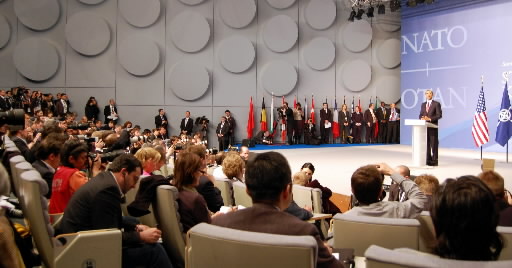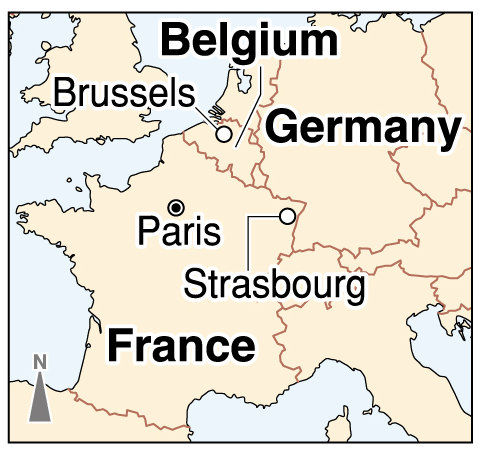Nuclear weapons can be eliminated: Chapter 4, Part 4
Jul. 15, 2009
Chapter 4: NATO's Cold War relics
Part 4: A new strategic concept
by Yumi Kanazaki, Staff Writer
Focus on whether or not to abolish tactical weapons
Security was tight in Strasbourg, France when the North Atlantic Treaty Organization (NATO) held its summit there to mark the 60th anniversary of the organization’s founding.
On April 4 strategic spots were barricaded by riot police, who engaged in tense standoffs with groups of young people. The demonstrators protested against NATO policy in Afghanistan and called for the dismantling of the organization, and some radicals set fire to a hotel.
On the same date, at a site on the outskirts of Strasbourg far removed from any turmoil, U.S. President Barack Obama, NATO’s leader, held a press conference following the summit.
“We agreed to develop a new strategic concept, which will be critical in modernizing NATO so that it can meet the challenges of our time,” Mr. Obama said in a resonant voice.
The strategic concept sets forth NATO’s long-term policy, including its nuclear policy. More than one year will be spent rewriting the current concept, which was revised in 1999. The questions of the reporters from various nations who filled the hall where the press conference was held focused primarily on the issue of NATO military forces in Afghanistan.
But the formulation of the new strategic concept also offers a good opportunity to review the status of NATO’s nuclear weapons. The current strategy stipulates that the tactical nuclear weapons (B61 bombs) deployed in Europe by the U.S. be maintained at a “minimum level.” At the same time, it is becoming widely acknowledged that the B61 is no longer militarily necessary, and it is possible that the new strategic concept will take a step toward the total abolition of the B61.
The flags of the 28 member nations of NATO, including Albania and Croatia, who recently joined, line the grounds of the organization’s headquarters in Brussels, Belgium.
James Appathurai, 40, a NATO spokesman, said, “Nuclear weapons are strictly controlled by the U.S., and there is no transfer of technology to non-nuclear nations. We are in complete compliance with the Nuclear Non-proliferation Treaty (NPT), so there is no problem.”
He added, “Nuclear weapons have already been substantially cut. It is unlikely that cuts will be a central issue when considering security in the 21st Century. They are an important political symbol, and few people have called for their elimination.”
Is there no incentive or motivation for completely abolishing NATO’s nuclear weapons?
With regard to this issue, Ian Davis, 47, a British expert on security issues, said, “Ordinary citizens must initiate the debate in order to establish a security system that does not rely on nuclear weapons.” Davis is the founder of NATO Watch, which held a Shadow NATO Summit in Brussels in March. He plans to come up with a proposal setting a future vision for NATO that could be included in its new strategic concept.
After the press conference in Strasbourg, Mr. Obama flew to Prague. The following day he delivered the historic “Prague speech” in which he stated that “as the only nuclear power to have used a nuclear weapon, the United States has a moral responsibility to act” and declared “America’s commitment to seek the peace and security of a world without nuclear weapons.” But he offered no specific framework for changes in NATO’s nuclear weapons.
(Originally published on June 18, 2009)
To comment on this article, please click the link below. Comments will be moderated and posted in a timely fashion. Comments may also appear in the Chugoku Shimbun newspaper.









